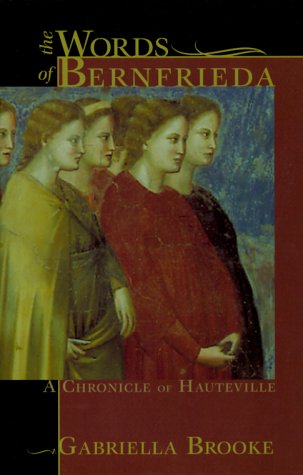The Words of Bernfrieda: A Chronicle of Hauteville
“The past is interesting only when it foreshadows greatness,” explains the monk Gaufredus Malaterra to this novel’s narrator, Bernfrieda, who questions why her lady’s life story will not be included in contemporary chronicles. To him, the importance of the noble Lady Fredesenda of Hauteville (1002-1063) is shown purely in terms of her relationship to her famous sons, Robert Guiscard, Duke of Apulia, and Rogier, Count of Mileto, two Norman knights who conquered lands in southern Italy. Bernfrieda, the companion, servant, and illegitimate half-sister of Lady Fredesenda (“Senda”), takes it upon herself to write her own chronicle of her life and times. Her recollections form the basis of this novel.
Throughout her life Senda is a kind, generous mistress to Bernfrieda, but her vision is myopic; she spends much of the novel feeling sorry for herself. Not permitted to marry the man of her choice, she’s instead promised in marriage to his father, Tancred of Hauteville, a minor nobleman over twice her age. Tancred loves her, but this feeling is never reciprocated. In the meantime, her household servants lead lives of the “nasty, brutish, and short” variety. Senda never takes a look around to see how fortunate she truly is.
The novel poses numerous questions on the nature of recorded history. Do chronicles always record the exact truth? Or is it also a chronicler’s duty to embellish the facts so as to glorify deeds and provide examples for future generations? What important details have we forgotten to record – or deliberately left out – over the years?
The author, a professor of Italian at an American university, chose a small academic press to publish her novel, an unusual choice. However, perhaps a reflection of this fact, the book is well researched down to the tiniest detail, from Norman wedding outfits to the portrayal of historical figures such as Senda’s Amazon-like daughter-in-law, Sichelgaita of Salerno. Though in reality little is known of Senda’s life, her fictional history as recorded here seems perfectly plausible. The only minor complaint I had is that I would have liked the author to clearly indicate in her cast of characters which ones were fictional.
The Words of Bernfrieda is not just for those readers with particular interests in “women’s history,” although it will surely find its niche there. Fans of Cecelia Holland’s Great Maria, another historical novel of Norman Sicily, will enjoy this one also, although Bernfrieda has more of a domestic, thoughtful feel. I don’t know if Ms. Brooke has plans to write any more historical novels, but I hope so.










